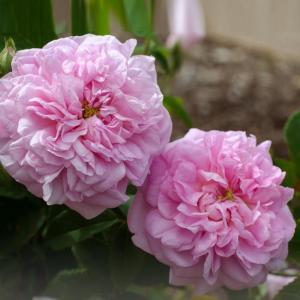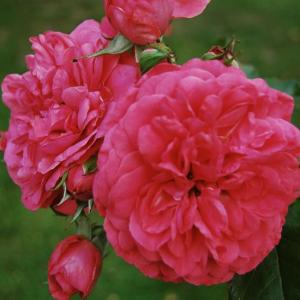
DAMASK ROSE FLOWER (ROSA DAMASCENA) - PLANTS

BASE / GENERAL DATA
Information submited: May 15, 2015 Modified: May 15, 2018 By: OperaDreamhouse
Rose is the king of flowers and Damask Rose is classified in Old Garden Roses. The origion of Damask Rose is Iran and the Middle East region and it is the national flower of Iran.
There are evidences that Rosaceae family is an ancient plant. Some fossils of rose are found in America that are 30 million years old.
The origin of Damask Rose is the Middle East and some evidences indicate that the origin of Rose wather is Iran, but the origin of its fragrant oil and extracts is Greece. This plant is cultivated in alll over the world including Iran, Europe, Bulgaria, Turkey and India.
Rosa Damascena, more commonly known as the Damask Rose, or sometimes as the Rose of Castile, is a Rose Hybrid, derived from Rosa Gallica and Rosa Moschata. Further DNA analysis has shown that a third species, Rosa Fedtschenkoana, is associated with the Damask Rose.
The flowers are renowned for their fine fragrance, and are commercially harvested for Rose oil, Rose otto, Rose absolute used in perfumery and to make rose water and "Rose concrete". The flower petals are also edible.
The Damask Rose is a deciduous shrub growing to 2,2 m tall, the stems densely armed with stout, curved prickles and stiff bristles. The leaves are pinnate, with five leaflets. The Roses are a light to moderate pink to light red. The relatively small flowers grow in groups. The bush has an informal shape.
Rosa Damascena is best cultivated in hedge rows to help protect the blooms from wind and to facilitate ease of picking. Gathering the flowersis quite labor - intensive as it must be done by hand. There are about twenty to forty days per year when harvesting occurs, depending on the type of Rosa Damascena cultivation in the region.
The Crusader Robert de Brie is often given credit for bringing this rose from Persia to Europe sometime between 1254 and 1276. The name refers to Damascus, Syria, a major city in the region. Other stories say the Romans brought the Rose to England, and a third account says that Henry VIII's physician gave him a Damask Rose as a present, around 1540.
For centuries, the Damascus Rose (Rosa Damascena) has been considered a symbol of beauty and love. The fragrance of the Rose has been captured and preserved in the form of Rose Water by an ancient method that can be traced back to biblical times in the Middle East, and later to the Indian subcontinent. An Iranian doctor, Avicenna, is credited with the discovery of the process for extracting Rose Water from Rose Petals in the early 11 century.
There are evidences that Rosaceae family is an ancient plant. Some fossils of rose are found in America that are 30 million years old.
The origin of Damask Rose is the Middle East and some evidences indicate that the origin of Rose wather is Iran, but the origin of its fragrant oil and extracts is Greece. This plant is cultivated in alll over the world including Iran, Europe, Bulgaria, Turkey and India.
Rosa Damascena, more commonly known as the Damask Rose, or sometimes as the Rose of Castile, is a Rose Hybrid, derived from Rosa Gallica and Rosa Moschata. Further DNA analysis has shown that a third species, Rosa Fedtschenkoana, is associated with the Damask Rose.
The flowers are renowned for their fine fragrance, and are commercially harvested for Rose oil, Rose otto, Rose absolute used in perfumery and to make rose water and "Rose concrete". The flower petals are also edible.
The Damask Rose is a deciduous shrub growing to 2,2 m tall, the stems densely armed with stout, curved prickles and stiff bristles. The leaves are pinnate, with five leaflets. The Roses are a light to moderate pink to light red. The relatively small flowers grow in groups. The bush has an informal shape.
Rosa Damascena is best cultivated in hedge rows to help protect the blooms from wind and to facilitate ease of picking. Gathering the flowersis quite labor - intensive as it must be done by hand. There are about twenty to forty days per year when harvesting occurs, depending on the type of Rosa Damascena cultivation in the region.
The Crusader Robert de Brie is often given credit for bringing this rose from Persia to Europe sometime between 1254 and 1276. The name refers to Damascus, Syria, a major city in the region. Other stories say the Romans brought the Rose to England, and a third account says that Henry VIII's physician gave him a Damask Rose as a present, around 1540.
For centuries, the Damascus Rose (Rosa Damascena) has been considered a symbol of beauty and love. The fragrance of the Rose has been captured and preserved in the form of Rose Water by an ancient method that can be traced back to biblical times in the Middle East, and later to the Indian subcontinent. An Iranian doctor, Avicenna, is credited with the discovery of the process for extracting Rose Water from Rose Petals in the early 11 century.

SPIRITUAL PRACTISES DATA

MEDICINE / HEALTH DATA

BEAUTY / COSMETICS DATA

FOOD / COOKING DATA
COMMENTS
No comments.



